GLASS ONION: A KNIVES OUT MYSTERY (2022)
Famed Southern detective Benoit Blanc travels to Greece for his latest case.

Famed Southern detective Benoit Blanc travels to Greece for his latest case.


Every so often, a film comes along that revitalises a long-neglected genre. It could be said that director Rian Johnson did this before, as his debut Brick (2005) gave the neo-noir a smart and punchy shot of energy, while Looper (2012) was one of the sharpest entries in the post-Christopher Nolan school of serious-minded sci-fi.
Knives Out (2019), his biggest non-Star Wars hit so far, made a strong argument that Johnson is a director capable of crafting something new from the old and decidedly un-hip. But ‘whodunnits’ have, of course, enjoyed a long and fertile life in the cinema. The idea they dried up isn’t quite accurate; instead, they transformed. One only needs to glance at the slasher genre to see the made-over, blood-drenched shape of the classic mystery film, re-purposed and re-invented for a new generation. Everything from the trash-classic Sleepaway Camp (1983) to the era-defining Scream (1996) utilised a murder-mystery template, smuggled in under the horror banner so as not to put off teens to whom the name ‘Agatha Christie’ evoked dusty old bookshelves in their grandparents’ houses.
Harder to ignore is the fact that, at any given time, you can flip through the channels and almost certainly stumble across repeats of Law and Order or CSI or any of a thousand crime procedurals promising murder, an investigation, a few commercial breaks, and a satisfying conclusion in just under an hour. Whodunnits never really vanished… they’ve been hiding in plain sight the whole time.
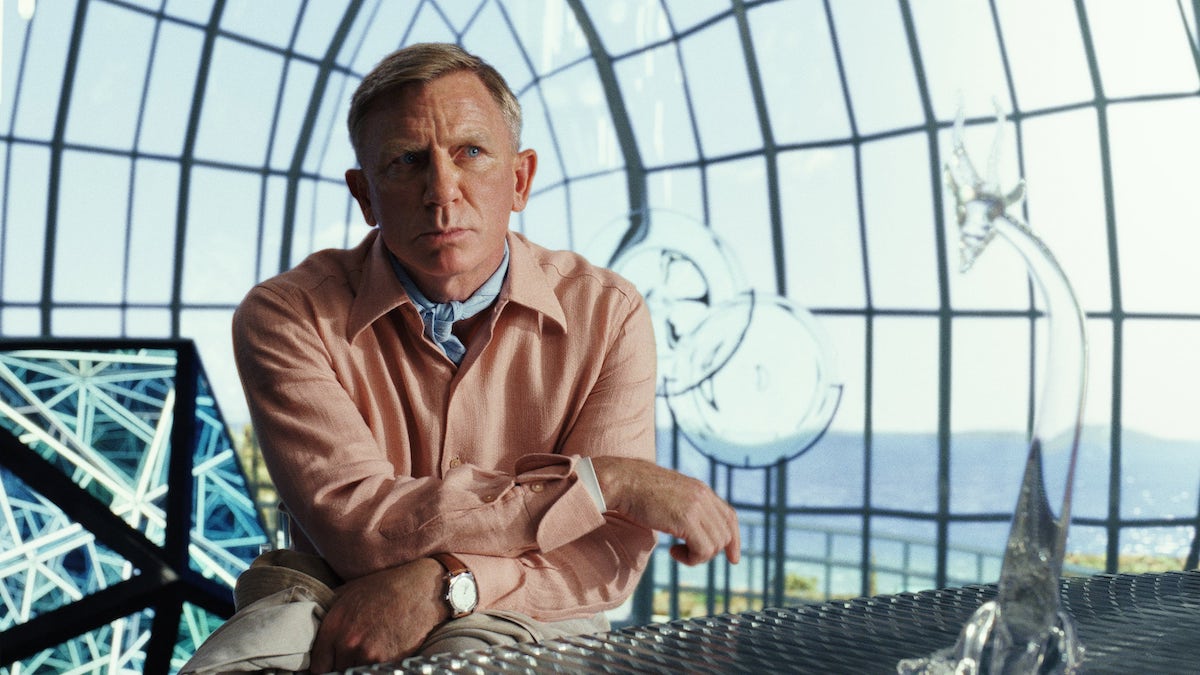
What Rian Johnson achieved with Knives Out was something different to reinvention. He delivered an intricately crafted, immensely satisfying whodunnit caper which was unembarrassed to be exactly what it was. Johnson wore the love of the genre on his sleeve; to him, Agatha Christie comparisons are an honour, not an insult. In the gleeful dorkiness of its plotting and its step-right-up showmanship, the film hit a very particular and often denied note of satisfaction that comes from a magician pulling one over on you, or a wrestler perfectly hitting a finisher that couldn’t possibly not kill its victim.
And now, with Glass Onion: A Knives Out Mystery, Johnson is tasked not with pulling the same trick twice but with pulling an entirely new one out of the bag. And for the most part, he succeeds with the confidence of a man who knows he has audiences in the palm of his hand.
The film begins with a group of friends each being delivered a literal mystery box, inside which is an invitation to the island of their billionaire pal, Miles (Edward Norton). The box contains a music box and a compass, an appetiser for what’s to come and a neat and propulsive way to introduce us to our new cast.
There’s Claire Debella (Kathryn Hahn), a soccer mom turned politician running for senator of Connecticut; Lionel Toussaint (Leslie Odom Jr), a scientist who leads the pack at Miles’ company, Alpha; Birdie Jay (Kate Hudson) a model and socialite, as well as employer and headache inducer of her long-suffering assistant Peg (Jessica Henwick); and Joe Rogan-esque tool and Twitch streamer Duke Cody (Dave Bautista), and his supposed-arm-candy girlfriend Whiskey (Madelyn Cline).
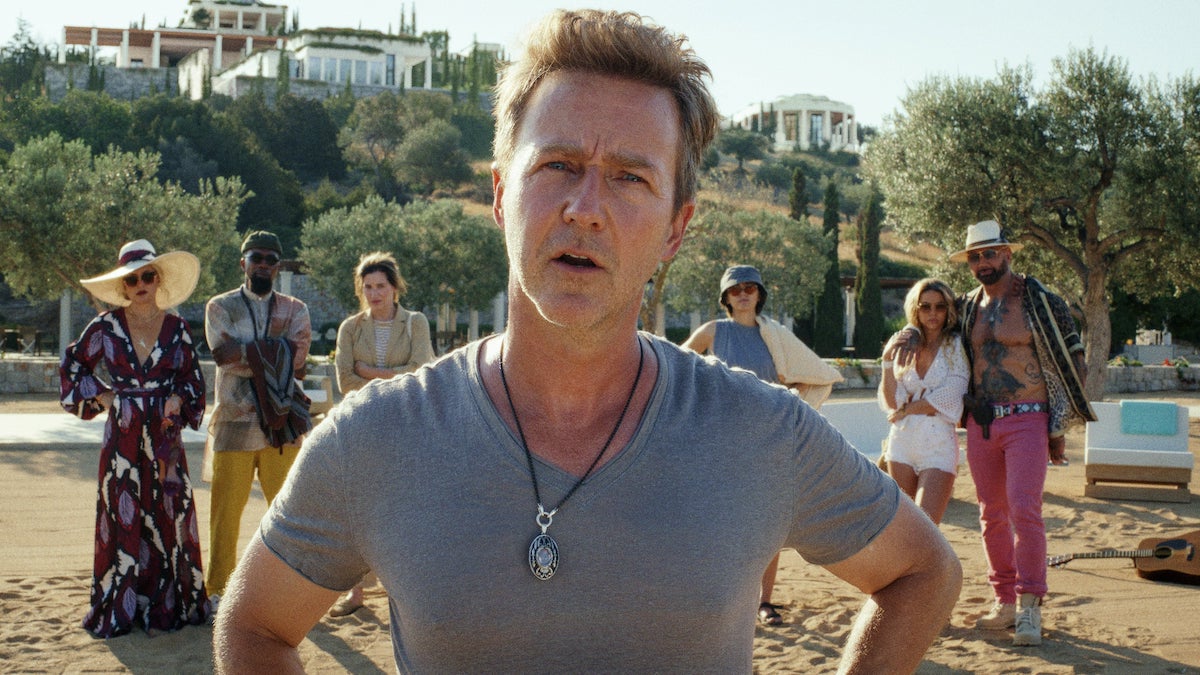
They gather together in a split (well, actually, revolving) screen video call to solve the puzzle, Johnson throwing us in at the deep end with some of the worst people in the world. Here his wit and deftness are on display—he juggles the characters and their respective locations with the precision of a Swiss watch, his ever-moving camera taking in the vast dynamics and mechanisms being put into place.
At a never-ending party, it’s not Birdie who solves part of the puzzle, but party guest Yo-Yo Ma (one of the film’s many cameos, the rest of which I won’t spoil here). On the other side of the country, Duke’s Brooklyn-accented mother effortlessly solves another part of it as he stands in impotent frustration, his gun tucked into a holster around his waist. These, we begin to suspect, are not people suited to solving anything at the murder-mystery game weekend that Miles has invited them to (he will be the ‘victim’, and they’ll have 48 hours to solve it). Elsewhere, outside of the video call, is Andi Brand (Janelle Monae), a screwed-over ex-business partner of Miles whose wordless anger still festers, evidenced in her brute-force opening of the box with a hammer. Some people don’t care for the preciousness of mysteries, it seems.
And finally, we meet our old pal Detective Benoit Blanc (Daniel Craig) while soaking in the tub and lamenting over webcam with his celebrity friends over the fact that, between cases, he has very little to do. Multiplayer games, Cluedo, crosswords, they’re all, as he puts it, dumb. Nothing scratches the itch of a good old-fashioned murder mystery. Lucky for him, an invitation to such an event has just arrived at his door.

If this sounds like a surplus of information and character names to remember, then rest assured that Johnson introduces each element with elegance and panache. Some depth and insight are sacrificed along the way to make room for red herrings and place-setting, but crucially, the film allows itself some breathing room for its most important assets: Blanc and Brand. Craig’s accent is so utterly Foghorn Leghorn-ian that one expects him halfway through to reveal it has itself been an act.
But he sells it with swagger and confidence, plus a hint of a lonely melancholy; a clear example of an actor relishing the opportunity to play the range of notes that he couldn’t with his most famous role. As comically outsized as he becomes, he doesn’t sacrifice the sheer entertainment and heart that accompanies him. He’s a detective who’s a few years older and has suffered through an isolating few years (the film makes explicit reference to the pandemic). He plays beautifully against fellow odd-one-out Andi, a role that Monae imbues with a wounded remoteness and iciness that’s hard to thaw.
And so they all arrive at Miles’ private island, greeted by a floating dock designed by Banksy and an hourly ‘gong’ sound that reverberates through the island, composed, he proudly states, by Phillip Glass. Miles sees Edward Norton in prime shithead mode, smirking and name-dropping his way through the glass mansion as he shows off robot dogs and priceless art, a man who sees the price of everything and the value of nothing. He calls his old friends ‘disruptors’, an actual term used by actual people who are desperate to see their extreme wealth and privilege as, somehow, a punk rock ethos. Each of them has benefitted from his empire, and from the dangerous substance—Klear, an alternative energy fuel—that it’s produced.
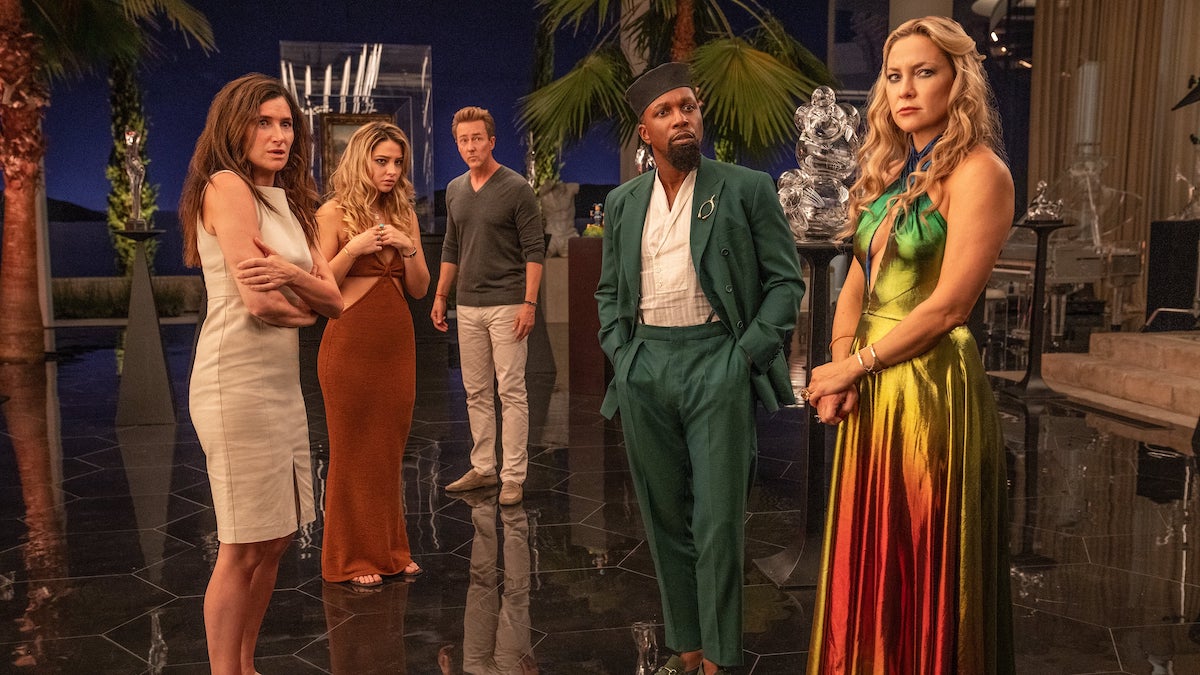
Johnson isn’t pulling any punches. One can find the real-life analogues of these dreadful people anywhere you look, and he is not subtle about who and what he is parodying. As correct as his summations of the people are, it all suffers from the same weakness that the first film did. The satire is not quite sharp enough to be taking up such a large part of the film here; where it was relegated to a few comments in the predecessor, here Johnson doubles down on these impulses, and it frequently falls flat in its desperation for currentness.
He’s right to be angry at the people he’s angry with, of course. And while some of it hits with a sting, it often comes across as less incendiary and more like a lukewarm subtweet. It isn’t enough to derail the film, and there are good jokes amongst the duds to carry it through (Jeremy Renner’s private batch of hot sauce is a funny little runner; as is Birdie comparing herself to Harriet Tubman).
And, as sidelined as they are, Bautista and Hudson are show-stealing. Hudson offers up a brilliantly exaggerated take on her iconic Penny Lane role, while Bautista is an impeccable meathead, beautifully selling lines that nobody else could. “Duke don’t dance with pineapple,” growled by the big man, is wonderful.
It all takes a while for the gears to begin turning, but when the bigger picture is revealed, everything begins to fall deliciously into place. Blanc warns that a murder mystery party in which Miles will be the ‘victim’ is a dangerous prospect, given that he’s surrounded himself with people who have every reason to despise him. And especially suspect is the fact that one of Miles’s guests wasn’t sent an invitation. So, how and why are they there?
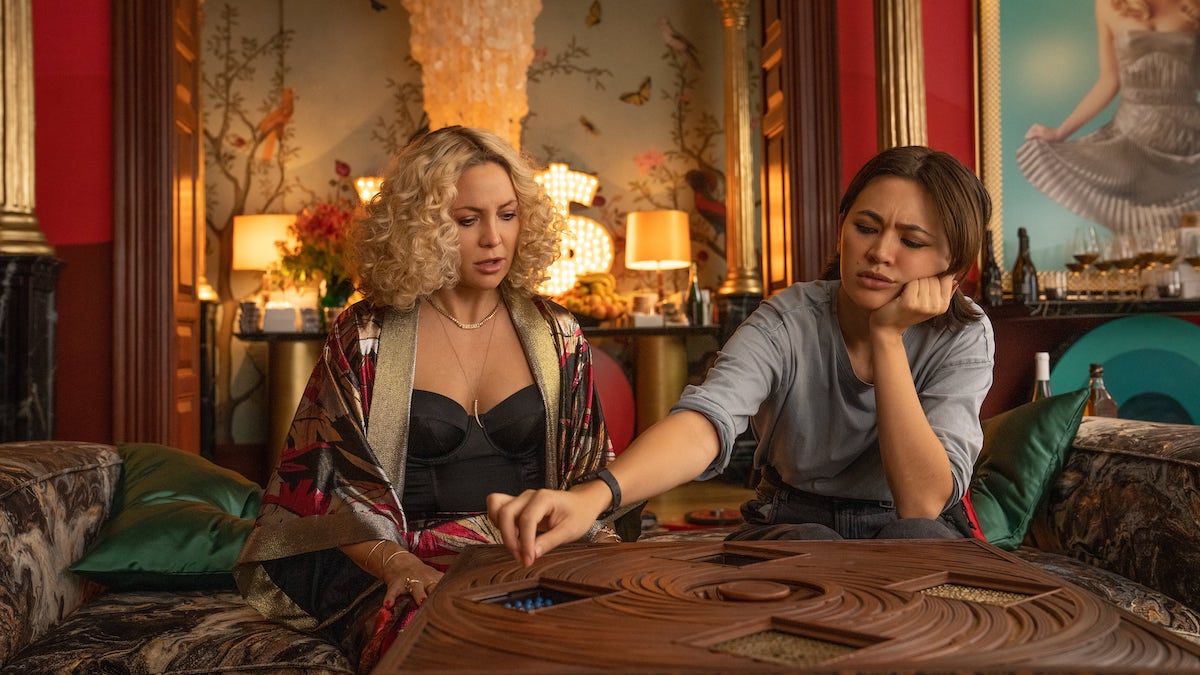
There are mysteries within mysteries, like mini-quests in a video game. There are double and triple bluffs, and after Miles’ mystery is quickly solved by an on-his-game Benoit, the real game, the one that’ll actually scratch his itch, begins. Johnson makes sure to stay two steps ahead with fakeouts and switcheroos, culminating in a mid-film sequence after the lights have gone out that is truly ingenious.
The shadow-play, the silhouettes darting here and there, the names whispered from around corners—it all feels like the distillation of what Johnson is getting at with these films, as stylish, funny and exciting as anything he’s filmed. It isn’t a subversion of a whodunnit scene—it’s a total synthesis of those classic scenes with Johnson’s own frantic style. It’s one of those deeply pleasing sequences when it becomes apparent, once again, that you are in very safe hands.
To discuss much more of the plot would be to spoil its many surprises. Johnson does not deviate in any dramatic way from his first film, and as such, expository flashbacks take up a large part of the Glass Onion’s second act. This isn’t a problem per se, but there is a lot of explaining to be done before it begins to click.
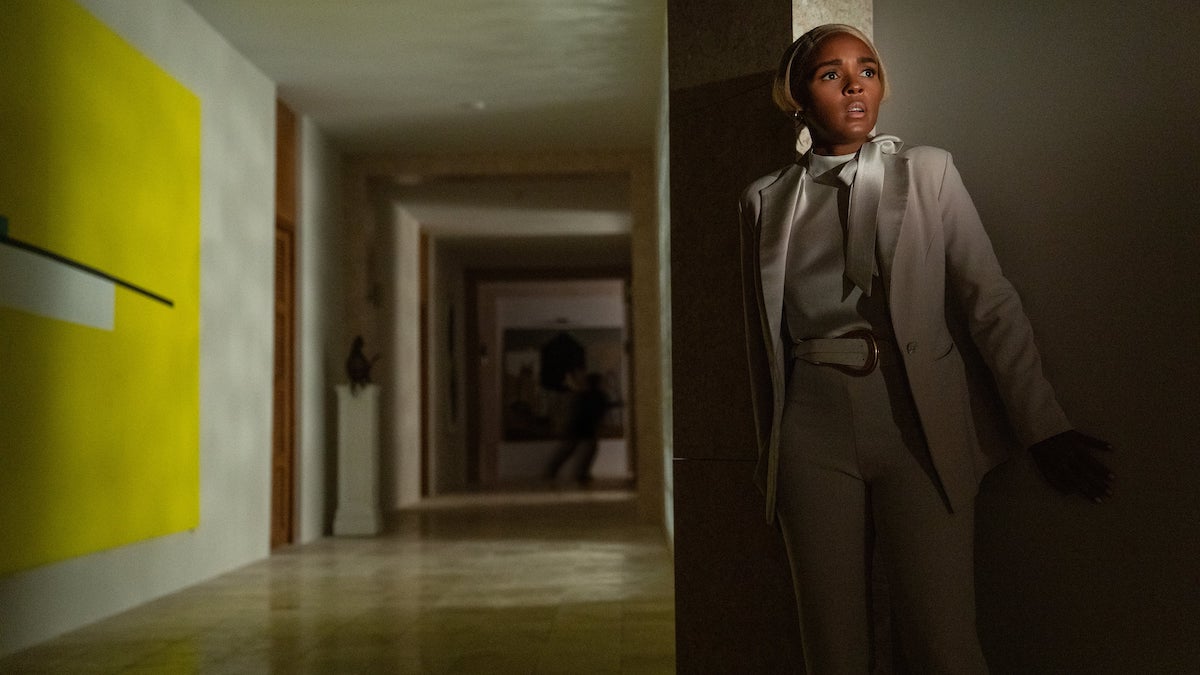
It’s the details that truly delight. If you watch one of Derren Brown’s tremendously entertaining live shows, he will always tell an audience how he’s duped them. He plays back clips of him slipping words into his act to plant them in an audience’s mind, to influence them towards his own designs. There is something of that as the film progresses, moment after moment of Johnson grabbing you by the collar and rubbing your face in the fact that you have been left obvious clues throughout.
As the film twists its way towards a conclusion, we are offered a final stretch that is satisfying in a different manner. A set piece of catharsis and emotional satisfaction caps things off, in a manner that suggests that Johnson had more on his mind throughout than simply solving a riddle. Mysteries are all well and good, and so is tech that seems magic, or a building in the shape of a glass onion that seems impossibly engineered. But these so-called magicians have us focussing so intently on the deck of cards that we don’t notice that we’ve been robbed blind while they perform their tricks. In a larger sense, Johnson suggests, we’ve all been screwed.
There are many different ways a film like this can be watched, but it’s hard to beat the feeling of being swept up by a mystery and totally fooled. That, really, is what ties this to the classic mysteries that inspired it, and even to the earliest films at the turn of the 19th-century. There’s a sense of magic to it, of a craftsman making an ornate object that you can’t yet comprehend, of the wool being pulled over your eyes and then, suddenly, seeing the light. And no, it does not reinvent the wheel. It is not an anti-whodunnit. Instead, it is an excellent, thoroughly modern execution of one of the longest-standing genres, the kind of film that has people saying ‘they don’t make films like that anymore’. Well, yes they do. Johnson has twice now, and if Glass Onion is just one of many Knives Out mysteries, then we’re all the better for it.
USA | 2022 | 139 MINUTES | 1.85:1 | COLOUR | ENGLISH

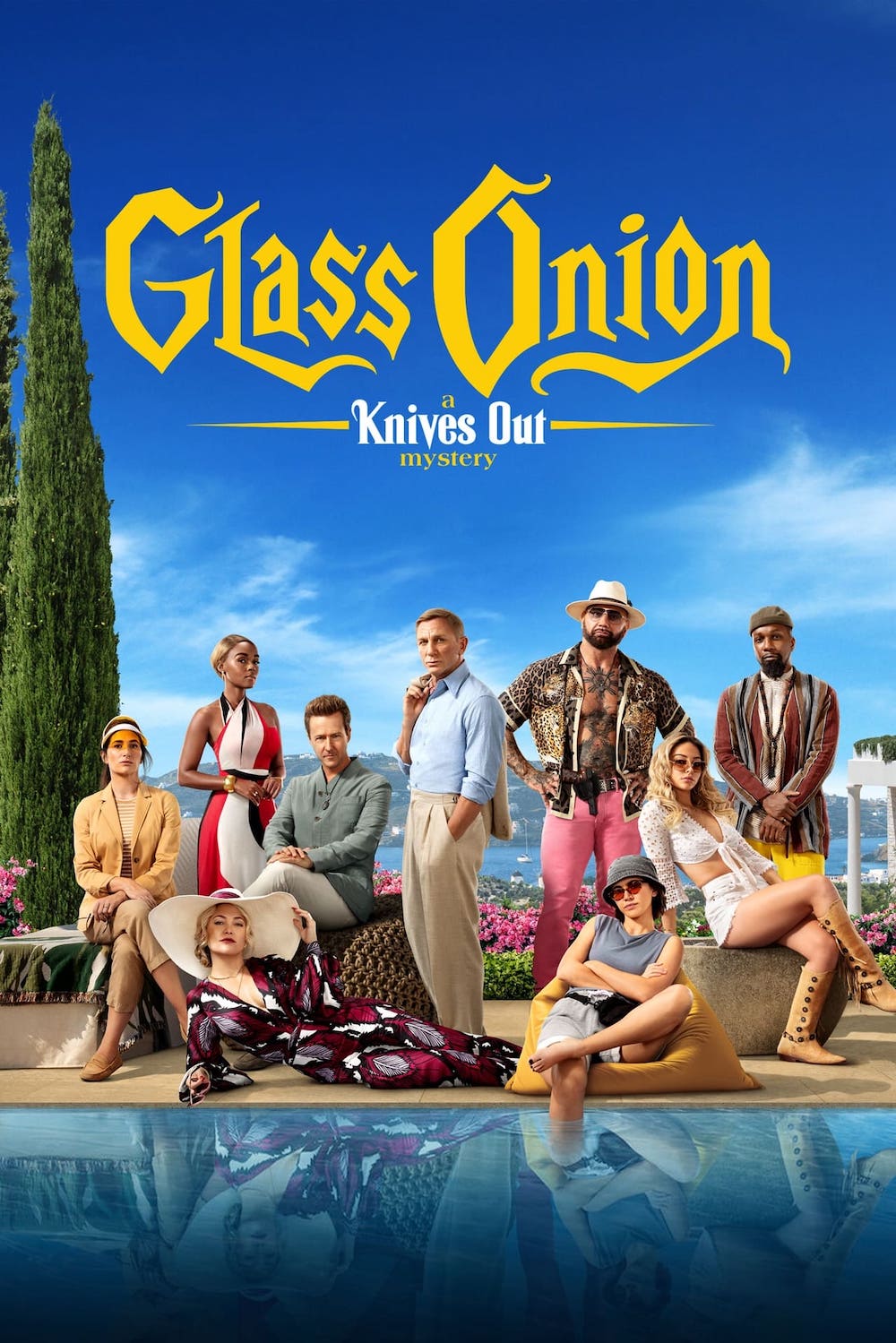
writer & director: Rian Johnson.
starring: Daniel Craig, Edward Norton, Janelle Monáe, Leslie Odom Jr., Jessica Henwick, Madelyn Cline, Kate Hudson, Kathryn Hahn, Ethan Hawke, Dallas Roberts & Dave Bautista.
